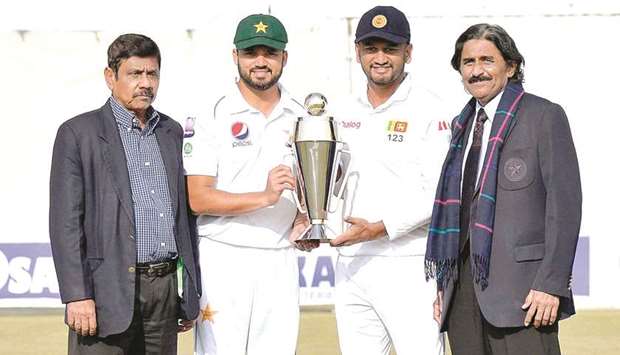Cricket is seriously pursued only in a handful of countries; indeed, the full members of the International Cricket Council number only 12. Pakistan is one, but the game in this cricket-mad country is only second to religion.
To be dead honest, that is how the nation and Pakistan cricket were woven for a long time. In the last decade that interest has waned a wee bit, but not waned enough to lose its status of the ultimate uniter. Yes, Pakistanis may bicker over anything under the sun, but when its cricketing fortunes are on an upswing, life can be ridiculously calm!
The decline in fortunes thanks to a lack of nurseries is owed massively to Pakistan losing hosting rights after the visiting Sri Lankan team came under a terrorist attack on March 3, 2009 as they headed for an ongoing Test match in Lahore, Pakistan’s cultural capital and cricket headquarters. The shocking episode in which eight people died and left a few Sri Lankan cricketers injured as their bus was fired upon by gunmen, effectively robbed Pakistan of international cricket at home, depriving fans of watching their heroes in action — some of whom never featured at home before their international careers ended!
What led to the unfortunate incident is well documented, including the heroic rearguard action by the Pakistani bus driver, whose presence of mind and gumption in speeding the bus out of a hail of gunfire prevented the worst possible. He later visited Sri Lanka on a special invitation and was hailed as a hero. But it was obviously not enough to save international cricket at home!
The irony of the matter is that Pakistan was fronting the global war-on-terror and that included countries which were both part of the war theatre as well as the ICC. Pakistan meanwhile was the biggest victim of this war’s fallout in terms of human and economic losses. Yet, no member country of the ICC was willing to consider treading the beaten path for all the sacrifices rendered despite offers of state-level security.
In Pakistan, during this time, fans felt embittered. Allowing for the failure to prevent the unfortunate attack in Lahore at the time of a politically charged atmosphere, they have long contended how terrorist attacks in other countries could similarly neither be prevented nor did these deprive them of hosting rights. The attacks in England, India, Sri Lanka and New Zealand are cited as examples.
Wednesday, December 11, 2019, therefore, will etch itself in history. Pakistanis are unlikely to forget who the tourists are, once again. Just months after they returned to feature in a limited overs series against Pakistan at the very venue (Lahore’s Gaddafi Stadium), which led to all this heartburn, Sri Lanka became the first international team to feature in a Test match on Pakistan soil after more than a decade — 3,935 days to be precise — yesterday. Perhaps, the fans can be allowed the liberty to see it as poetic justice.
The venue this time is Rawalpindi Cricket Stadium. The stadium itself holds some significance: the first international played here was also against Sri Lanka. It was also the first ever international covered by this scribe, and the frenzied interest of the fans meant that a seating capacity of about, 28,000 fell abysmally short and led to overcrowding with the result that one was left trying to save young female fans caught in the melee than focus on the action out in the middle. Later, a reward and certificate for ‘hardship’ reporting was probably consolation enough!
This encounter in 1992 also turned out to be Imran Khan’s last international on home soil before he went on to lead Pakistan to a fairytale triumph a few weeks later in Australia. Incidentally, Khan is now the country’s prime minister, and it is fair to assume that he would have more than a passing interest in the game.
While the long-suffering Pakistani public’s emotional attachment to the resumption of Test cricket at home is understandable, it is important to get to the dénouement in the context of history. The uninitiated can be forgiven for thinking why has Sri Lanka chosen to tide over widely circulated apprehensions surrounding the “security” situation in Pakistan — even when the country has come a long way after successfully fighting the menace of terrorism on its soil.
The bilaterals play a significant role here and are evident in the strong political and defence ties as well as the ‘first love’ that binds the nations, historically: cricket. Pakistan’s steadfast and active support helped Sri Lanka overcome challenging situations in the region and, talking specifically of cricket, Pakistan manoeuvred to get the island nation full membership of the ICC by rallying other Asian nations in 1981. In subsequent years, Pakistan stood by Sri Lanka, and in a particular episode when Australia refused to play a fixture of the 1996 World Cup there, teams from Pakistan and India travelled to Sri Lanka to show solidarity.
Pakistani fans openly backed the Sri Lankan team in the final against Australia in that edition in Lahore — an act of generosity that the World Cup-winning Sri Lankan captain Arjuna Ranatunga never forgot and has since consistently, supported the return of international cricket to Pakistan.
Two months ago, when Sri Lanka’s key players pulled out of the limited overs series and the visiting board president complained about being “fed up of security”, Ranatunga blasted him and exhorted his board to take a history lesson.
“People running the game at present perhaps, do not know how much Pakistan helped us during our early days,” he said.
Regardless of the on-field results, what is certain is that a full strength Sri Lankan team for this tour has signalled Colombo’s intention to play its part in reviving the good old times in a country with whom its river of goodwill runs deep.
* The writer is Features Editor. He tweets @kaamyabi

YESTERDAY ONCE MORE: Current Pakistan captain Azhar Ali and Sri Lankan skipper Dimuth Karunaratne holding the trophy with Bandula Warnapura, left, and Javed Miandad, right, before the start of the first Test in a decade which began at the Rawalpindi Cricket Stadium yesterday. Warnapura and Miandad led their respective sides in the first ever Test between the two countries in 1982.

